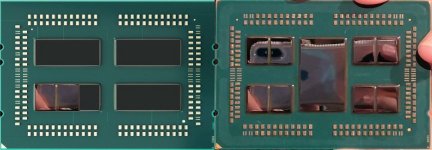Soldato
Epyc, just launched for Datacentre, this is Naples. 
Link to the AMD EPYC product page - http://www.amd.com/en/products/epyc
Research paper showing hte benefits of EPYC single socket soluiton. - http://www.amd.com/system/files/2017-05/TIRIAS-AMD-Single-Socket-Server.pdf
EPYC Features

Link to the AMD EPYC product page - http://www.amd.com/en/products/epyc
Research paper showing hte benefits of EPYC single socket soluiton. - http://www.amd.com/system/files/2017-05/TIRIAS-AMD-Single-Socket-Server.pdf
EPYC Features
- A highly scalable, 32-core System-on-a-chip (SoC) design, with support for two high-performance threads per core
- Industry-leading memory bandwidth, with 8 channels of memory per EPYC device3. In a dual-socket server, support for up to 32 DIMMS of DDR4 on 16 memory channels, delivering up to 4 terabytes of total memory capacity
- Complete SoC with fully integrated, high-speed I/O supporting 128 lanes of PCIe® 3, negating the need for a separate chip-set
- Highly-optimized cache structure for high-performance, energy-efficient computing
- Infinity Fabric coherent interconnect for two EPYC CPUs in a dual-socket system
- Dedicated security hardware
Last edited:



 ), the thing that absolutely crushes everything that came before and makes the industry stand up and take note. The thing is we all know how this goes, history says AMD innovate, intel take it on the chin perfect a similar design and run away with it. Is it really any different this time?
), the thing that absolutely crushes everything that came before and makes the industry stand up and take note. The thing is we all know how this goes, history says AMD innovate, intel take it on the chin perfect a similar design and run away with it. Is it really any different this time?

